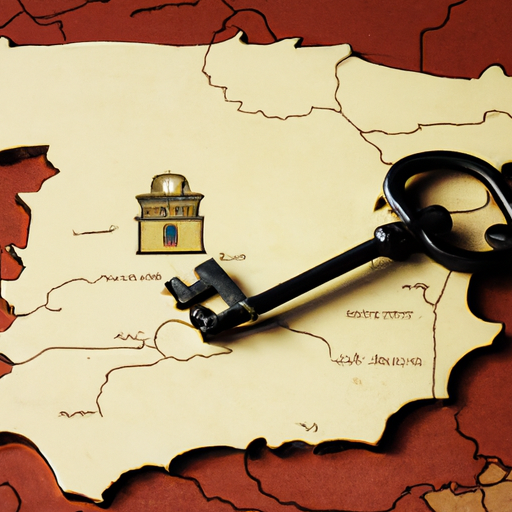How to Easily Get Residency in Spain
Introduction
Residency in Spain through the non lucrative visa can be the perfect way to move to Spain. It offers a straightforward way for those with independent means to make the move to sunny Spain.
Spain, a country known for its vibrant culture, delectable cuisine, and stunning landscapes, holds a certain allure for expatriates from around the globe. A popular choice for those seeking to establish residency is the Non-Lucrative Visa. This type of visa allows individuals to live in the country without the necessity of employment or business activities.
Shifting your life to Spain could be a decision that opens up a world of opportunities. Living in this culturally rich nation not only offers an improved quality of life but also provides access to excellent healthcare and education systems. The mild Mediterranean climate combined with the lower cost of living compared to other Western European countries makes Spain an attractive destination for many.
Equipped with a Non-Lucrative Visa, one can fully immerse in Spanish life – savoring the famed tapas, participating in lively fiestas, and embracing the siesta way of life. By obtaining this residency, you are granted the privilege of residing in Spain longer than 90 days, which is the usual limit for tourists.
Remember, though this route involves comprehensive planning and careful adherence to rules, the reward is well worth it: A life steeped in Spanish exuberance.
What is a Non-Lucrative Visa?
A Spain non-lucrative visa, often referred to as a retirement visa, is a specific type of residency permit that allows non-European Union (EU) nationals to reside in Spain without engaging in any form of commercial activity or employment.
The purpose of such a visa is to offer an opportunity for individuals who wish to enjoy the Spanish lifestyle and culture without participating in the work sector. Ideal for retirees, digital nomads, and other non-workers, this visa encourages cultural enrichment and exchange while ensuring that the Spanish labor market remains unaffected.
To be eligible for a Spain non-lucrative visa, applicants must fulfill certain criteria:
- Financial Stability: Applicants must demonstrate sufficient financial resources to support themselves (and any dependents) during their stay in Spain without needing employment or business income.
- Health Insurance: Applicants are required to have health insurance coverage from an authorized provider in Spain.
- No Criminal Record: Applicants should not have any criminal record within the past five years.
- Health Status: Applicants should not suffer from any diseases that could pose serious public health risks.
Meeting these eligibility criteria is the first step towards obtaining a residency permit in Spain with a non-lucrative visa. It’s important to note that each application is evaluated on its own merits, and meeting these requirements does not guarantee approval. Each applicant’s situation can be unique, so it’s advisable to consult with a legal expert or immigration advisor when applying.
In the following sections, we delve deeper into the specifics of these requirements and how you can ensure your application has the best chance of success.
Income Requirements for Residency in Spain with a Non-Lucrative Visa
In the quest to acquire a Spanish non-lucrative visa, one can’t sidestep the conversation about income requirements. Spain, like any other country, is keen to ensure that those seeking residency can sustain themselves financially. This helps maintain the economic balance and social fabric of the country.
Proof of income is thus a critical part of the non-lucrative visa application process. But what exactly are these income requirements?
Meeting the Threshold for Residency in Spain
Income requirements
To qualify, you should demonstrate an annual income of at least €28,800 or €2,400 per month. For each additional family member accompanying you, an extra €7,200 per year is required.
Note: These figures are current in 2023 but subject to change and should be verified at the time of application.
Proof of Sufficient Funds
Proofing this level of income involves more than just stating your earnings. You must provide documentation as evidence. The documents could be:
- Bank statements showing regular deposits
- Investment portfolios demonstrating constant returns
- Regular rental income from properties
- Proof of a pension if retired
This list is not exhaustive, and other sources of regular passive income can be considered.
Verification and Authentication
Documentation provided must be verifiable and authenticated. They should also be translated into Spanish by a certified translator if originally in another language.
It’s essential to remember that this requirement seeks to confirm your ability to live in Spain without working locally. Therefore, having a job offer from a Spanish company doesn’t count towards meeting this requirement.
Navigating non-lucrative visa income requirements might seem daunting initially due to all the paperwork involved. However, with proper planning and organization, it isn’t an insurmountable hurdle.
In the next section, we will delve deeper into the application process of acquiring your non-lucrative visa — equipping you with a step-by-step guide on how to apply for your residency in Spain successfully.
Application Process for a Non-Lucrative Visa
The Spanish non-lucrative visa application process may seem daunting at first glance but fear not. With the right guidance and a checklist of required documents, it can be navigated smoothly. This section will provide you with step-by-step instructions to help demystify the process.
- Complete the Application Form: The first step is to fill out the non-lucrative visa application form. This form requests your personal details, passport information, and other vital data. It’s crucial to be truthful, as any discrepancies could lead to your application being denied.
- Prepare Required Documents: Next, gather the required documents, which typically include the following:
- A valid passport
- Proof of sufficient income (as discussed in the previous section)
- Medical certificate stating you are free from any contagious diseases
- Criminal record checks from your country of residence for the past five years. Remember, all documents must be translated into Spanish by a sworn translator and legalized.
- Pay the Application Fee: After completing the application form and gathering all necessary documents, you need to pay the non-lucrative visa application fees. These fees vary depending on your country of origin but are generally around 60 Euros.
- Submit Your Application: Lastly, submit your completed application packet to your nearest Spanish Embassy or Consular Office. It can take up to three months for applications to be processed, so be sure to apply well in advance of your planned move date.
Let’s delve a little deeper into one critical aspect – where do you submit your application?
Your application should be submitted in person at a Spanish Embassy or Consular Office in your country of residence. Each embassy has its own regulations regarding appointments, so it’s worth checking their website or contacting them directly for specific instructions.
Submitting an application might feel like throwing it into a black hole; however, rest assured that each document is carefully reviewed by consular officers who assess if you meet all requirements for this particular visa.
The non-lucrative visa offers a pathway into Spain without requiring employment or substantial investment in the country – but it does demand patience, attention to detail, and thoroughness during the application process.
Next up: We’ll explore what benefits come with holding a non-lucrative visa and why it might just be your ticket to residing in sunny Spain.
Benefits of a Non-Lucrative Visa
The non-lucrative visa possesses an array of advantages for those seeking to establish residency in Spain, making it an alluring option that is worth exploring.
One significant advantage of this visa type is the freedom it grants. Holders are not tied to employment or business ownership in Spain, allowing them to enjoy their time in the country without the stress of work commitments. A non-lucrative visa can serve as a gateway to a relaxed lifestyle, soaking up the sunshine and immersing oneself in Spanish culture.
Freedom to Travel: This visa is not just a ticket to Spain, but also offers visa-free travel within the Schengen Zone. This means you can travel across 26 European countries without any additional visa requirements, an ideal perk for those with a penchant for European exploration.
Access to Public Services: Non-lucrative visa holders are granted access to public services such as healthcare and education. This means that you and your dependents can avail of Spain’s world-class public healthcare system and send your children to public schools.
Pathway to Permanent Residency: One of the most enticing benefits of a non-lucrative visa is its potential as a launchpad towards permanent residency. After residing in Spain for five continuous years on this visa, one can apply for permanent residency.
Family Reunification: The non-lucrative visa allows for family reunification. This means that if you’re able to support your family financially, they can also obtain a non-lucrative visa and move with you to Spain.
In essence, a non-lucrative visa translates into tangible benefits: freedom from work commitments, unhindered travel across Europe, access to public services and a pathway towards permanent residency. It opens up opportunities for enjoying life in Spain with your loved ones by your side.
Renewal and Validity of a Non-Lucrative Visa
An essential aspect to consider when obtaining a non-lucrative visa is its validity period. The initial non-lucrative visa is valid for one year, but don’t overlook this fact as it’s crucially important. After this initial period, the visa can be extended through renewals.
Embarking on the journey of renewal, you’ll find it’s not as daunting as it might seem. The first renewal grants an additional two years of residency; subsequently, renewals are every two years.
The requirements for renewal are straightforward yet necessitate careful attention. You need to demonstrate a clean criminal record and continue to meet the income requirements. Additionally, you must have stayed in Spain for at least 183 days during the previous year.
Consider the following details in your renewal process:
- Criminal Record: A clean criminal record from your home country and Spain is mandatory.
- Income Requirements: You need to maintain the minimum income requirement that was established when you first applied.
- Residency Obligation: You’re required to live in Spain for more than half of the year (183 days), else you risk losing your residency rights.
Remember, preparation and timely submission of your renewal application is key. It’s advisable to begin your renewal process around 60 days before your current residency expires.
Next on our journey, let’s delve into an interesting comparison between the non-lucrative visa and another popular option – the Golden Visa.
Comparison: Non-Lucrative Visa vs. Golden Visa
As we explore ways to get residency in Spain, two visa types immediately come to mind – the non-lucrative visa and the Golden Visa. Both offer distinct pathways to Spanish residency, yet they differ significantly in terms of requirements, benefits, and investment options.
The non-lucrative visa is designed for individuals who wish to reside in Spain without engaging in any commercial activity or employment. It necessitates proof of sufficient financial resources to support oneself during the stay. The primary appeal lies in its simplicity and minimalistic approach – there’s no need for a heavy financial investment in the country.
On the other hand, the Golden Visa program targets affluent individuals and investors who can make significant contributions to the Spanish economy.
Non-Lucrative Visa
- No requirement for business activity or employment
- Proof of sufficient income required
- Renewal process based on maintaining income level
Golden Visa
- Requires a substantial investment (minimum €500,000 property purchase)
- Provides an option for self-employment or starting a business
- Fast-tracked residency process
While both visas grant residency rights, the Golden Visa offers more privileges and flexibility. It allows holders to work and start businesses in Spain, which isn’t possible with a non-lucrative visa. Its fast-track process is also enticing for those eager to establish their roots quickly.
Another key difference lies within investment options. For instance, Golden Visa applicants can invest in real estate, shares or deposits in Spanish companies, public debt instruments, or even projects of general interest. This diversity contrasts with non-lucrative visas that don’t require investments.
To sum up this comparison:
The non-lucrative visa is suited for those seeking a relaxed lifestyle in Spain without commercial commitments; conversely, the Golden Visa caters to active investors eager to participate in Spain’s vibrant economy.
It’s crucial to weigh these differences and align them with your personal circumstances before choosing between these two paths toward Spanish residency.
Conclusion
This discourse has journeyed through the realm of residency in Spain via a non-lucrative visa, illuminating its benefits and breaking down its application process. A clear understanding has been established of what a non-lucrative visa entails. It is essentially an opportunity for individuals who have sufficient resources to sustain themselves without needing to work in Spain.
The income requirements, which stand as a key determinant for eligibility, have been meticulously discussed. They ensure that the individual can comfortably reside in the country without becoming a financial burden.
Delving into the application process, it was observed that it involves a series of steps, including the provision of certain required documents and payment of stipulated fees. The submission point for applications– the Spanish Embassy or Consular Office– was equally pointed out.
Through this discussion, it became evident that obtaining a non-lucrative visa comes with privileges, such as enjoying the rights of a Spanish resident while having freedom to travel throughout the Schengen Zone.
The visa’s validity period and renewal process were also touched on, offering insights into maintaining one’s status in the long term.
A comparison with the Golden Visa program threw light on different avenues available for gaining residency in Spain, showing that options abound depending on one’s financial capabilities and investment interests.
It is hoped that this exposé ignites your desire to delve deeper into the process. Getting residency in Spain with a non-lucrative visa is straightforward if you follow the steps outlined here.
Contact us for personal help with residency overseas, second citizenship and asset protection.
Your Questions Answered:
What is a non-lucrative visa for Spain?
A non-lucrative visa is a type of residency permit in Spain. The purpose of this visa is to allow individuals to reside in Spain without engaging in any lucrative activities or employment.
Who is eligible for a non-lucrative visa?
The eligibility criteria for obtaining a non-lucrative visa may vary, but generally, it requires the applicant to have sufficient economic means to support themselves without working during their stay in Spain.
What are the income requirements for a non-lucrative visa in 2023?
To qualify, you should demonstrate an annual income of at least €28,800 or €2,400 per month. For each additional family member accompanying you, an extra €7,200 per year is required.
How can I apply for residency in Spain with a non-lucrative visa?
The application process involves filling out the required forms, paying the application fees, and submitting your application at the Spanish Embassy or Consular Office. Detailed instructions on how to apply can be found on their official website.
What’s the difference between a non-lucrative visa and Golden Visa?
While both visas allow residency in Spain, they differ mainly in terms of requirements, benefits, and investment options. The Golden Visa program typically requires an investment in real estate or other assets in Spain. The non lucrative visa doesn’t require investment.










